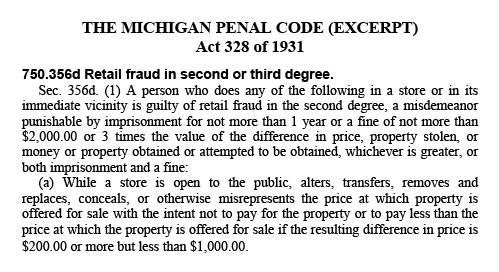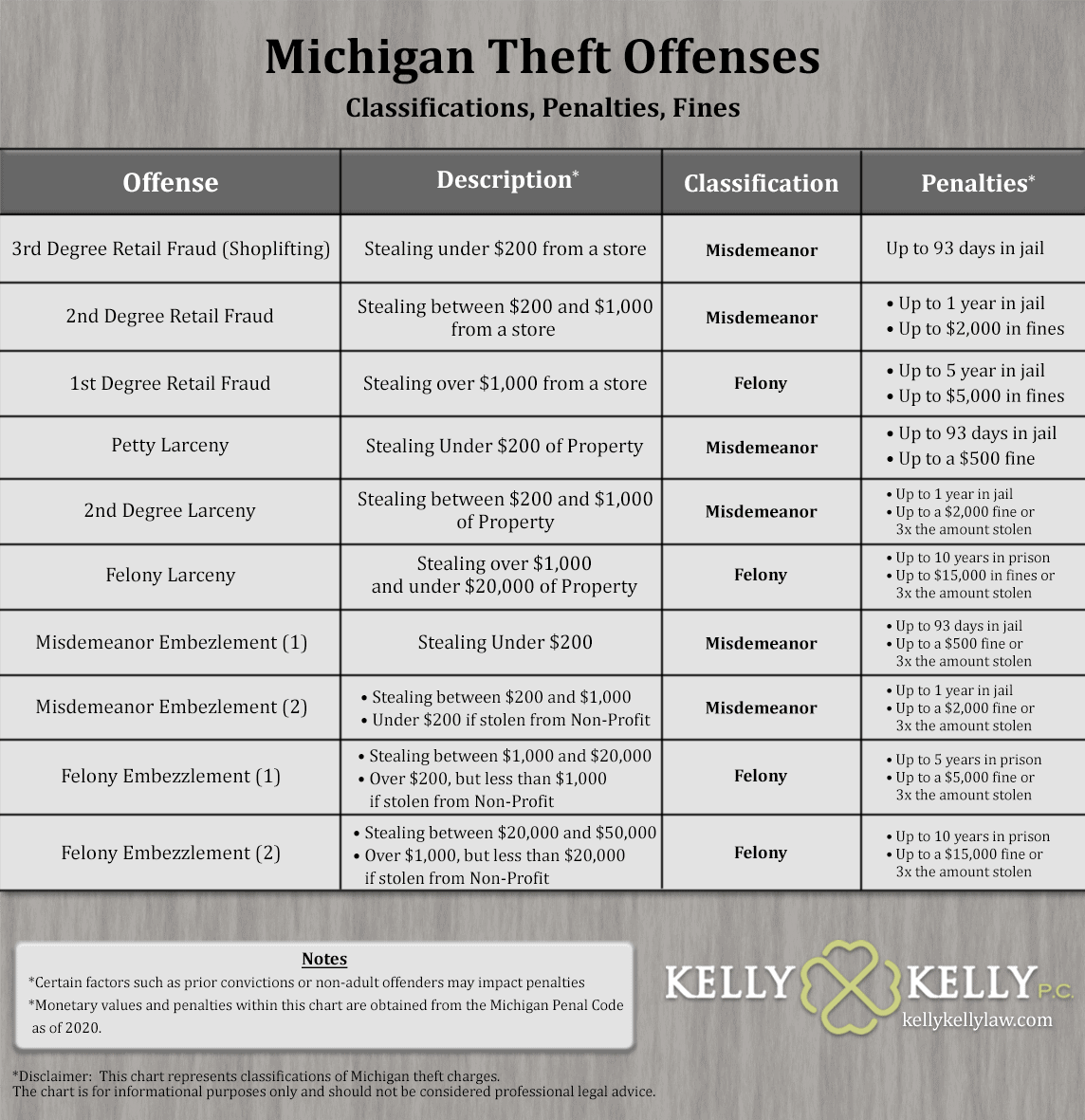
Partner, Juvenile Lawyer
Juvenile Shoplifting
Juvenile defense lawyers specialize in legal issues affecting minors. They advocate for young clients in court, addressing matters that may range from school discipline to criminal charges. This includes juvenile shoplifting & juvenile petty theft crimes.
Kelly & Kelly P.C. has significant experience in juvenile law. Our attorneys provide legal representation for minors in various contexts ranging from school-related offenses to more serious legal challenges. Our team offers counsel and support for both individuals and families navigating the complexities of the juvenile legal system.
Your mistake doesn’t have to land you in jail or compromise your future.
Michigan Shoplifting Laws
In Michigan, shoplifting is legally referred to as retail fraud and is classified into degrees based on the value of the stolen goods and the circumstances of the theft. The charges can range from a misdemeanor for lower-value items to a felony for higher-value goods or if the individual has previous convictions. Penalties include fines, restitution, and possible jail time. Michigan law also allows for civil damages to be sought by merchants.
Retail Fraud which is also referred to as shoplifting is the act of stealing property from a store. There are varying degrees of Retail Fraud depending on the monetary value of property stolen and/or or other factors (i.e. prior convictions).
3rd Degree Retail Fraud occurs when the alleged stolen property is valued under $200. Retail Fraud in the 3rd degree is a misdemeanor punishable by 93 days in jail.
2nd Degree Retail Fraud occurs when the alleged stolen property is valued between $200 – $1,000. Retail Fraud in the 2nd degree is a misdemeanor punishable by up to 1 year in jail and $2,000 in fines.
1st Degree Retail Fraud is charged when the alleged stolen property is valued over $1,000. Retail Fraud in the 1st degree is a felony punishable by up to 5 years in jail and $5,000 in fines.
It’s important to note, being issued a ticket by a police officer is not enough to convict you of the crime itself. Retail Fraud requires proof beyond a reasonable doubt the following elements:
- You took property the store offered for sale.
- You moved the property from its original position.
- The place where you took the item was a store open to the general public, or in the immediate area around the store.
- There was intent to steal the property.
- The place where you took the item was a store open to the general public, or in the immediate area around the store.
- The value of property taken fits the degree of the charge.
Types of Juvenile Theft Crimes
In Michigan, there are several classifications/types of theft each with varying degrees of penalties. Here are some of the more common types.
- Burglary
- Car Theft
- Credit Card Fraud
- Embezzlement
- Felony Theft
- Identity Theft
- Larceny
- Misdemeanor Theft
- Retail Fraud (Shoplifting)
- Robbery (Theft by force)
It’s important to note, robbery differs from theft in that robbery involves using force or the threat of force to steal whereas theft simply refers to someone stealing property that doesn’t belong to them.
Juvenile Petty Theft
Juvenile petty theft in Michigan refers to minors unlawfully taking property valued at a relatively low amount—typically under a specific threshold. The act is considered a less serious offense compared to grand theft but still carries potential legal consequences.
The juvenile justice system tends to focus on rehabilitation over punishment, with possible penalties including community service, diversion programs, restitution to the victims, or probation. The aim is to educate the minor about the consequences of theft and to prevent future offenses.
Juvenile Larceny
 Larceny refers to the act of stealing property from another individual or business without the use of force. This offense differs from retail fraud in that the alleged theft isn’t specific to a retail store. For example, larceny may involve someone stealing money from another person’s wallet, or stealing someone’s phone, laptop, etc. There are varying degrees of larceny depending on the monetary value of property stolen and/or or other factors (i.e. prior convictions).
Larceny refers to the act of stealing property from another individual or business without the use of force. This offense differs from retail fraud in that the alleged theft isn’t specific to a retail store. For example, larceny may involve someone stealing money from another person’s wallet, or stealing someone’s phone, laptop, etc. There are varying degrees of larceny depending on the monetary value of property stolen and/or or other factors (i.e. prior convictions).
Petty Larceny occurs when the alleged stolen property is valued under $200. Petty Larceny is misdemeanor punishable by 93 days in jail AND A $500 fine.
2nd Degree Larceny occurs when the alleged stolen property is valued over $200 and under $1,000. Larceny in the second degree is a misdemeanor punishable by up to 1 year in jail and up to $2,000 in fines or 3 times the value of stolen property (whichever is greater).
Felony Larceny occurs when the alleged stolen property is valued over $1,000 and under $20,000. Felony Larceny is punishable by up to 10 years in prison with fines up to $15,000 or 3 times the value of stolen property (whichever is greater).
Our Juvenile Defense Attorneys
This page was legally reviewed by Michael Kelly. Michael has been a practicing criminal defense attorney and juvenile lawyer for many years. Throughout this time he’s represented clients through various complex issues involving the education and criminal court system. This includes, representing students accused of criminal offenses, suspension/expulsion, DUI/OWI charges, expungements, and more. Michael has served on the ICLE Criminal Law Advisory Board and is recognized as top 10 Under 40 for Criminal Defense in Michigan by The National Academy of Criminal Defense Attorneys. He also regularly contributes to the Institute of Continuing Legal Education (ICLE) as a speaker on issues involving criminal law and juvenile defense.





